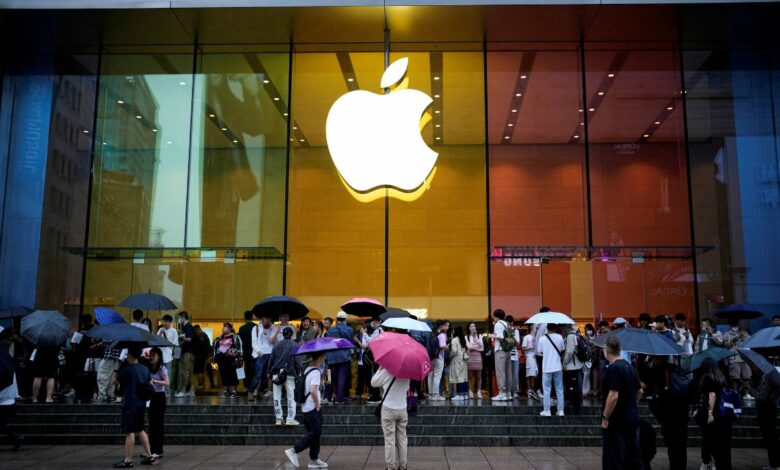Apple predicts boost in AI features after uneven third quarter

Apple predicted that the new artificial intelligence features would lead to iPhone upgrades in the coming months, helping the company recover from a sales slowdown that has hit its China business particularly hard.
CEO Tim Cook spoke on a conference call Thursday about third-quarter results, saying that new Apple Intelligence features will give customers a new reason to buy new phones.
“It will be a very important moment for a compelling upgrade cycle,” he told analysts on the call.
The comments followed generally upbeat third-quarter results marred by sluggish sales in China. Apple returned to revenue growth in the period ended June 29, with revenue rising 5 percent to $85.8 billion, beating analysts’ estimates of $84.5 billion.
However, sales from China fell 6.5 percent to $14.7 billion, missing Wall Street’s forecast of $15.3 billion.
Shares bounced in late trading after the earnings report. They were up more than 1 percent by 6:30 p.m. in New York. The stock had risen 13 percent this year through the close, fueled by investor hopes that new artificial intelligence technology would boost sales.
The results in China have fueled fears that Apple is losing ground in one of its key overseas markets. The company is facing stiffer competition in the region and the government has restricted the use of foreign technology in some workplaces. China’s economic growth has also slowed.
Apple attributed much of the decline to the impact of a strong dollar, saying its underlying business in China is actually healthier than before. Three months ago, executives said the slowdown had less to do with an underperforming iPhone and more to weak sales of other products.
“We realize it’s a very competitive smartphone market, but we think we’re doing quite well within the context of the broader economy,” Chief Financial Officer Luca Maestri told Bloomberg Television’s Emily Chang.
Cook said during the call that Apple still has confidence in the market. “I don’t know how every chapter of the book reads, but we have a lot of confidence in the long run,” he said.
September quarter
Apple said total revenue in the September quarter will grow at a similar rate to the period that just ended, implying an increase of about 5 percent. Wall Street has forecast a 4 percent clip. Services will be a highlight of the period, up double digits, executives said.
Earnings were $1.40 per share in the third quarter, above the $1.35 analysts had estimated. The period ending in June is typically one of Apple’s slowest, at a time when many customers are waiting for the next iPhone, which arrives in the fall.
Sales of Apple’s flagship iPhone hit $39.3 billion. While the number was down slightly from a year earlier, it beat Wall Street expectations. Three months ago, the company declined to forecast iPhone sales for the June quarter — a sign that it was still uncertain about the faltering smartphone market.
iPad comeback
Apple’s iPad business has benefited from a long-awaited release of new models. The company introduced major upgrades in May after a sluggish period for its tablet lineup. The new products included a higher-end iPad Pro with an M4 chip, as well as a faster version of the iPad Air with a larger screen option.
The Cupertino, California-based company reported revenue of $7.16 billion in the category, up 24 percent. That topped estimates of $6.6 billion. Apple previously said it expected iPad sales to grow by a double-digit percentage point in the June period — something it easily achieved. For several months, some customers and schools had been holding off on buying the iPad in anticipation of the new models.
“About half of the customers who bought an iPad were new to the product,” Maestri said.
In addition to the new iPad Pro and iPad Air, Apple is working on versions of its entry-level iPad and iPad mini with faster processors. That could lead to additional upgrades when they launch sometime in the coming months.
Apple Intelligence
The company also unveiled Apple Intelligence this past quarter, showing off the new AI tools at its developer conference in June. But the technology — which is set to come to iPhone, iPad and Mac — isn’t expected to be released to customers until October. Apple also hasn’t yet explained how it plans to monetize the features, other than by driving demand for compatible devices. And the technology won’t initially be available in China.
The services business, which includes the App Store, Apple Music and the TV+ streaming platform, continues to be a growth engine, generating $24.2 billion in revenue in the most recent quarter, up 14 percent.
Wall Street had been looking for just under $24 billion in revenue from services. But that business is under pressure from regulators who want to make changes to the App Store, which they see as an anticompetitive force in the industry. That could ultimately limit Apple’s ability to collect revenue from subscriptions and app downloads.
Mac revenue rose 2.5 percent to $7.01 billion, helped by the start of the back-to-school shopping season, in line with Wall Street forecasts.
Apple hasn’t made any major changes to the Mac since late last year, but it did add the M3 chip to the MacBook Air laptop in March. The computer line could get a boost later this year when Apple moves to the more powerful M4 chip. The company plans to update every Mac line with the new processor, which is better suited to handling AI tasks, Bloomberg News reported.
Wearables, Home and Accessories — a once-high-flying category that included AirPods, the Apple Watch, the company’s TV set-top box, Beats headphones and HomePods — continued to struggle. That business generated $8.1 billion in sales, down 2.3 percent. Still, that was better than the $7.8 billion estimate.
Apple has made only minor changes to its most recent smartwatch line, and a patent dispute forced the company to remove a blood oxygen feature from some models. The company also hasn’t updated its AirPods in several quarters.
But improvements are on the way: Apple plans to introduce larger displays for some watch models this fall, in addition to a refresh of its lower- and mid-range AirPods.
The upcoming iPhone 16 line should drive a wave of demand. But the new models won’t feature any major design changes. The company’s marketing pitch for the iPhone 16 will revolve more around support for Apple Intelligence, faster processors, the addition of an action button on lower-end versions and a camera control button on the latest Pro models.
© 2024 Bloomberg LP




